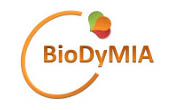ED EDISS grant Ph.D. thesis offer
BioDyMIA is looking for candidates willing to apply to an EDISS Grant
Location: BOURG en BRESSE
Laboratory (acronym): BIODYMIA
PhD supervisor (name, email address): Pr. Pascal Degraeve, pascal.degraeve@univ-lyon.1fr (50%)
Co-supervisor 1 (name, email address): Dr. Isabelle Adt, isabelle.adt@univ-lyon1.fr (50%)
X EDISS fellowship 2021 o Other funding
Project description including a short introduction, aim/objectives and methods/approach to be used
BioDyMIA research scope is focused on the preservation of perishable foods including the control of unwanted microorganisms by other ones such as bioprotective lactic acid bacteria (LAB) or by antimicrobial biomolecules (e. g. antimicrobial proteins or their fragments, bacteriocins, plant phenolics…). BioSCAM group namely investigates analytical procedures allowing the detection and/or the localization of: i) antimicrobial biomolecules within complex matrices (food, (bio) polymers ...) in order to characterize the mechanisms of action of these agents; ii) (biochemical) markers which can be used to detect at an early stage a microbiological contamination and/or a food degradation (including organoleptic or nutritional quality defects) during shelf life.
Food spoilage is caused by a wide range of chemical and biochemical reactions due to physical, chemical, and/or microbial factors. The nature of degradation depends on the food type (fish, meat, vegetables…). Thus, studies of food component modifications (due to microbial development or physical / chemical factors) are often specific of, i) one type of food / meal, for example, Viji et al. [1] have studied the biochemical (and sensorial modifications) of sutchi catfish in addition with microbiological evolution during 30 days storage; ii) one type of alteration, for example, the effect of oxidation factors on nutritional quality of foodstuffs (as reviewed in ref [2]). More and more researches in this field are based on metabolic approaches, providing a good understanding of studied markers but sometimes using chemometric tools which are powerful but often more limited regarding the identification and understanding of molecular mechanisms involved in foodstuffs deterioration [3]. Thus, to date, it is difficult to define which type of markers could be used as indicators of early stage of food degradation and/or food contamination by microorganisms during food storage (as food matrices are complex multicomponent systems, it is not so easy to assay minor molecules).
The objectives of the PhD thesis consist in the research of components (generated by food alteration and/or microbial flora) that could be used as food quality indicators during storage for selected animal origin foodstuffs such as raw meat, fish or dairy products. These markers will be used to appreciate slight modifications of food composition which can be used as (future microbial) contamination indicators and/or, to qualify the impact of (bio)preservation systems used on food. Analytical tools developed in this work will be based on analytical biochemistry techniques (HPLC, GC, enzymatic activity assays…) as well as spectroscopic techniques (IR: MIR, NIR spectroscopies and ATR imaging …). First experiments will be performed with high-added value animal origin perishable foodstuffs such as raw bovine minced meat for which microbial ecosystem evolution during their preservation has recently been determined. Special attention will be paid to environmental control of (bio)active systems used for food preservation with instrumented cells to impose different atmospheric gaseous compositions (O2, CO2 composition and %RH) and temperature to the systems for in vitro and in situ studies.
References
[1] Viji et al. J Food Sci Technol (2015) 52:3312–3321.
[2] Santos-Fandila et al. Austin J Anal Pharm Chem (2014) 1:1005-1012.
[3] Cheng J et al. Food Anal. Methods (2015) 8:1141–1149.
Skills required: Food science, Analytical Biochemistry, Microbiology
Application procedure: send a detailed CV and the contact details of 2 academic referees to the PhD supervisor



 en
en